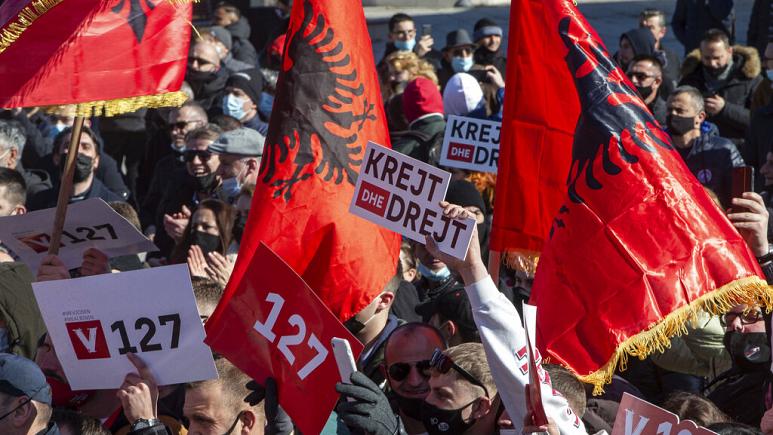

How EU enlargement apathy could push Kosovo and Albania to join forces

How EU enlargement apathy could push Kosovo and Albania to join forces - 2021-04-09
On a visit to Albania in March, Kosovo’s new prime minister, Albin Kurti, called on Albanians to vote for change as Kosovars did on February 14: “Albanians deserve better,” he said.
Kurti, an ethnic-Albanian along with around 90% of Kosovo’s 1.8 million population, urged voters to elect the members of his leftist-nationalist Vetevendosje movement who are running for seats in the Albanian parliament on April 25 on an anti-corruption mandate.
It was anti-corruption and opposition to entrenched political elites that led to Vetevendosje’s landslide election on February 14. Kurti now serves as prime minister while his ally, Vjosa Osmani, was sworn in as president on April 4. Vetevendosje has 58 seats in Kosovo’s 120-seat parliament, a working majority with the support of 10 non-Serb minority politicians.
In Albania, such a result is extremely unlikely, especially given that Vetevendosje is competing in just three counties with its leader, Boiken Abazi, running in the capital Tirana. Albania’s election later this month remains a two-horse race, with Edi Rama’s Socialist Party and the Democratic Party of Albania, under Lulzim Basha, the two main parties.
Vetevendosje, which has only been active for two years in Albania, may not even pass the 1% threshold to enter parliament, according to recent polls.
It is the nationalist part of Kurti and Vetevendosje’s "leftist nationalist" designation that relates to unification - or reunification, as it is referred to in both countries.
Ever since Kosovo declared its independence from Serbia in 2008 the two nations have established shared diplomatic missions and signed as many as 140 bilateral agreements, and during the war with Serbia in 1998 and 1999, Albania opened its doors to hundreds of thousands of Kosovar refugees fleeing violence and ethnic cleansing.
For many Kosovars, a union with Albania would provide security against an increasingly expansionist and nationalist Serbia, and make it more difficult for Belgrade to meddle in the politics of its neighbour via Kosovo’s 120,000-strong Serbian minority. It is also seen as an alternative to Kosovo’s perennially-stalled negotiations with the European Union.
Unification would likely be opposed by all of Kosovo’s international allies and would scupper the EU and US-brokered dialogue with Serbia. As such a referendum on a union with Albania has often been threatened by politicians in Kosovo when relations are particularly strained with Brussels or Washington, much to the chagrin of American and European leaders.
Anti-corruption
In 2019, Hashim Thaci threatened to hold a referendum on Kosovo joining Albania, although Kosovo’s constitution currently lacks the mechanism to do so. In February 2021, Kurti told Euronews that if a referendum were held on unification - or re-unification, as many Kosovars refer to it - he would vote in favour of Kosovo joining a federation with Albania.
But despite its long and storied history and huge support in Kosovo - a recent poll had 64% of Kosovars saying they would vote yes - it was not a major campaigning issue for Vetevendosje in the run-up to the February poll. It was as a leftist and not a nationalist party that Vetevendosje dominated - and ultimately triumphed - on February 14.
“Lëvizja Vetëvendosje (LVV) of Kosovo managed to clinch to power only when it ditched its nationalist rhetoric and ran on an anti-corruption campaign,” Alfonc Rakaj, an analyst, told Euronews.
“Ethnic Albanians are first and foremost concerned with welfare, economic prosperity and stability. As a result, it is imperative to improve living standards, boost democratic credentials and accountability as a counterweight to nationalist appeal.”
Just as Vetevendosje avoided the issue of unification in the run-up to February 14, so its Albanian sister party has in the run-up to 25 April. That, analysts say, is for the best.
“It doesn’t resonate with Albanians and is practically a non-issue for the public at large,” said Rakaj.
Abazi, Vetevendosje’s candidate in Tirana, told Euronews Albania that he supports a referendum in both states on unification. But in its campaign, it has focused on the issue indirectly: for example, by lobbying for a lifting of the toll on the highway that connects Kosovo and Albania. Mostly its campaign has echoed Kurti’s: combatting corruption and tackling elites.
While nationalism has seen a resurgence recently in countries such as Serbia and Hungary, that has not been the case in Albania. In 2013, for example, a newly-established nationalist party, the Red and Black Alliance called for unification with Kosovo during elections and secured less than 11,000 votes nationwide. Its leader’s call for a referendum was largely ignored.







